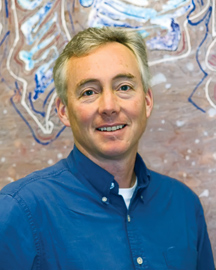

|
plasma Surface interactions science center
 |
| Professor Dennis Whyte, PSFC Principal Investigator for the PSI Center. |
University of California, Berkeley to create a Center for the study of Plasma-Surface Interactions (PSI). Funded by the Office of Fusion Energy Sciences, the PSI Center will receive $6.9 million over five years, with the PSFC receiving about one third. Prof. Dennis Whyte, PSFC Principal Investigator for the PSI Center, has long been interested in how particles at the plasma edge behave, and how they affect the wall materials of their confinement vessels, such as tokamaks used in fusion research. Whyte notes, "The demands on plasma-facing materials in a steady-state fusion device will be extreme." Some materials might erode or degrade quickly, requiring frequent replacement; others might eject too much material into the plasma, contaminating it. Finding answers to questions about the physics of plasma interactions at this boundary could affect future choices in fusion engineering.
At the PSFC, PSI experiments will be performed using DIONISOS, a unique combination of an accelerator with a high-power laboratory plasma. This experiment uses a steerable high-energy ion beam to analyze in real time materials being bombarded by plasma. Within the tripod structure of the Center, the PSFC is primarily responsible for measurements and diagnostics. The UCSD Center for Energy Research performs experiments that expose materials to plasma, while UC Berkeley Department of Nuclear Engineering focuses on numerical modeling of the materials.